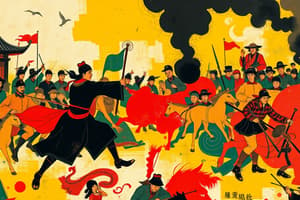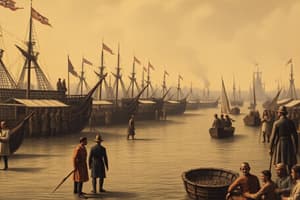Podcast
Questions and Answers
Which country acquired control over India and Burma by the 19th century?
Which country acquired control over India and Burma by the 19th century?
- USA
- Britain (correct)
- Portugal
- France
Until the 19th century, China was open to European trade.
Until the 19th century, China was open to European trade.
False (B)
What did the Chinese refer to their country as?
What did the Chinese refer to their country as?
Celestial empire
The trading of ______ to China resulted in addiction.
The trading of ______ to China resulted in addiction.
What was declared illegal in China in 1800?
What was declared illegal in China in 1800?
The British were cooperative with the Chinese government following the opium trade ban.
The British were cooperative with the Chinese government following the opium trade ban.
Who was the Chinese officer sent to suppress opium smuggling?
Who was the Chinese officer sent to suppress opium smuggling?
Which of the following was NOT a reason historians attribute as a cause of the Opium War?
Which of the following was NOT a reason historians attribute as a cause of the Opium War?
According to Chinese belief, the earth was believed to be ______ in shape.
According to Chinese belief, the earth was believed to be ______ in shape.
What was one consequence of the British refusal to comply with China's demands?
What was one consequence of the British refusal to comply with China's demands?
Flashcards are hidden until you start studying
Study Notes
The Opium War and Its Causes
-
European Imperialism in 19th Century Asia: Britain controlled India and Burma, France controlled Indochina, and the Netherlands held influence in Indonesia. European and American nations sought to expand their economic interests into China and Japan.
-
China's Isolation and Cultural Pride: China, considered the "Celestial Empire," valued its ancient culture and disdained foreigners. This insular approach led to stagnation and a lack of interaction with the outside world.
-
European Trade Interests: European nations, driven by trade ambitions, sought access to Chinese markets, especially for silk and tea. They initially paid in silver but sought alternative trade goods.
-
Opium Trade: The British East India Company started trading opium with China, leading to widespread addiction and a drain of Chinese silver. This practice was met with resistance from the Chinese government.
-
The First Opium War (1839-1842):
- The Chinese government, under Commissioner Lin, cracked down on opium smuggling, seizing and destroying opium stocks.
- Tensions escalated when a dispute involving British sailors led to a trade ban on British goods.
- The British, with superior naval power, emerged victorious in the conflict.
-
Historians' Perspectives on the War:
- Cultural Clash: Historians like Fairbank and Li Chien Nung argue that cultural differences between Eastern and Western civilizations were a primary cause of the conflict.
- Inequalities of Canton Trade: Michael Greenberg suggests that unfair trading practices in Canton were a contributing factor.
- Opium Trade as the Catalyst: Chinese historians like Tan Chung and Karl Marx emphasize opium as the root cause of the war.
-
China's Arrogance: China viewed itself as the center of civilization, regarding other nations as inferior and tribute-paying subjects. This attitude fueled tensions with European nations seeking equal diplomatic standing.
-
Western Advances and Friction: European nations, having made strides in commerce, seafaring, and naval power, desired to trade with China on equal terms. China's resistance to this concept fueled friction.
Studying That Suits You
Use AI to generate personalized quizzes and flashcards to suit your learning preferences.




